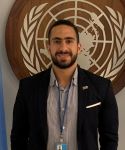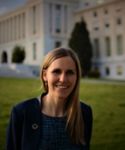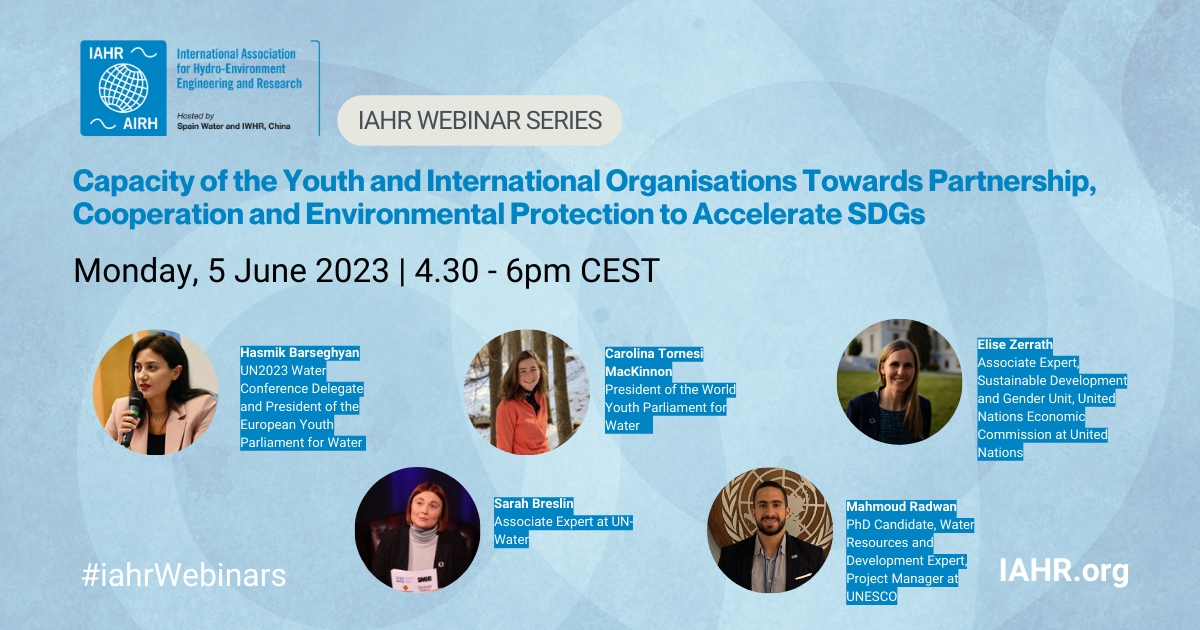Webinar Summary Report | Capacity of the Youth and International Organisations Towards Partnership, Cooperation and Environmental Protection to Accelerate SDGs
Event Presentations Watch on demand
Report authored by: Hadis Mohajerani. IAHR Working Group on Sustainable Development Goals and Young Professionals representative in the IAHR Council. PhD Researcher at Department for Physical Geography, Trier University, Germany)
Panellists
Hasmik Barseghyan. UN2023 Water Conference Delegate and President of the European Youth Parliament for Water (EYPW).
Carolina Tornesi MacKinnon. President of the World Youth Parliament for Water.
Elise Zerrath. Associate Environmental Affairs Officer, United Nations Economic Commission for Europe.
Mahmoud Radwan. PhD candidate at Ecole Polytechnique of Paris, water resources and development expert, currently a Project Officer at UNESCO headquarters in Paris
Sarah Breslin. Associate Expert at the UN-Water Technical Advisory Unit, working as Program Manager in Sustainable Finance at WWF Sweden.
IAHR facilitators
Hadis Mohajerani. Webinar convener. IAHR Working Group on SDGs and Young Professionals representative in the IAHR Council.
Angelos Findikakis. IAHR liaison with UN-Water.
Tom Soo. Executive Director of IAHR.
Elpida Kolokytha. Chair of the IAHR Working Group on SDGs
Amparo López. IAHR Vice-President, IAHR SDGs WG
Introduction
The webinar brought together a diverse panel of experts, each shedding light on vital aspects of acceleration towards the SDGs. This report presents the main points from each panellist, exploring their viewpoints on groundwater governance, water resources, youth engagement, and cooperation between nations. The report also delves into the multifaceted definitions of acceleration proposed by the speakers, offering insights into diverse approaches to fostering positive change. Furthermore, the report summarizes the dynamic discussion segment, highlighting the vibrant exchange of ideas. It aims to serve as a valuable resource for all those passionate about accelerating progress towards a more sustainable and equitable future.
Defining Acceleration
Throughout the webinar, the panellists shared diverse perspectives on acceleration, presenting various definitions that can be summarized as follows:
Acceleration refers to the urgent and concerted effort to speed up progress towards achieving SDGs, particularly SDG 6 on clean water and sanitation. It involves setting bold priorities, allocating resources, and taking concrete actions to address the pressing challenges of water scarcity and pollution.
In the context of SDGs and water-related changes, acceleration entails scaling up efforts and implementing innovative solutions to overcome barriers hindering sustainable water management. It involves leveraging technology, knowledge exchange, and collective action to bridge the gap between policy formulation and on-the-ground implementation.
Acceleration emphasizes breaking down barriers and accelerating governance processes related to water resources. It involves increasing stakeholder engagement, especially involving youth, and building capacity through a youth-centric approach to decision-making. By addressing regulatory gaps, insufficient data, and financial constraints, acceleration aims to make groundwater management more visible and effective.
Acceleration in the realm of SDGs signifies the need to move from breakdown to breakthrough. It demands meaningful youth engagement, institutionalization of youth participation, and accessibility of decision-making processes. Acceleration acknowledges the slow pace of progress in achieving SDGs and highlights the vital role of young people as torchbearers for transformative change.
Acceleration is about doing more for SDG 6, adding action, people, and financing to achieve the goals. It involves collaborating with various stakeholders, including young people, and working together to make a bigger impact. Acceleration recognizes the importance of inclusive and collaborative approaches to overcome water challenges at local and global levels.
Comprehensive Definition of Acceleration
Reflecting on the insights of all panelists, a comprehensive definition of acceleration towards implementing SDGs can be outlined as follows:
"Acceleration, in the realm of Sustainable Development Goals (particularly, SDG 6), embodies a collaborative and innovative approach aimed at expediting progress towards achieving SDG 6 on clean water and sanitation. It calls for urgent action, bold prioritization, and inclusive engagement, bringing together diverse stakeholders, including youth, as equal partners in decision-making processes. Acceleration demands the breaking down of barriers hindering sustainable water management, addressing regulatory gaps, insufficient data, and financial constraints. Through knowledge exchange, leveraging technology, and sharing best practices, acceleration bridges the gap between policy formulation and on-the-ground implementation. It recognizes the urgent need to scale up efforts, implement creative solutions, and allocate adequate resources to overcome water scarcity, pollution, and inequitable access to clean water. Embracing the transformative power of youth, the process of acceleration envisions a future where collective action and innovative solutions drive tangible progress towards a sustainable and equitable world, leaving no one behind on the path to a better future."
Summary of Panellists´ Insights
Below is an in-depth overview of the panellists' key highlights.
 Sarah Bresline. Discussed the urgency to increase the pace of progress fourfold to achieve SDG 6 by 2030. She emphasized the need to identify tools and frameworks for faster progress and effective responses to challenges. She mentioned that UN Water, along with its members and partners, has identified five accelerators under the SDG 6 Global Acceleration Framework. Sarah believes that engagement between international organisations, particularly those affiliated with UN Water, and youth-led initiatives can be more effective. She presented examples of collaboration in areas such as data collection, capacity development, and youth participation in decision-making processes. During her presentation, Sarah shared essential guiding principles on meaningful youth engagement from the Office of the Secretary-General's Envoy on Youth. One important principle she mentioned was the institutional mandate, which ensures youth's role is reflected in legal documents. Notably, youth played a significant role in the UN 2023 Water Conference, representing over a third of registered stakeholders and actively contributing in plenary sessions and interactive dialogues. The Water Action Agenda was mentioned as a valuable resource for identifying commitments from stakeholders worldwide. Sarah encouraged youth-led initiatives to leverage this database and participate in upcoming events like the SDG 6 Water Action Agenda Special Events and the SDG Summit to further contribute to SDG progress.
Sarah Bresline. Discussed the urgency to increase the pace of progress fourfold to achieve SDG 6 by 2030. She emphasized the need to identify tools and frameworks for faster progress and effective responses to challenges. She mentioned that UN Water, along with its members and partners, has identified five accelerators under the SDG 6 Global Acceleration Framework. Sarah believes that engagement between international organisations, particularly those affiliated with UN Water, and youth-led initiatives can be more effective. She presented examples of collaboration in areas such as data collection, capacity development, and youth participation in decision-making processes. During her presentation, Sarah shared essential guiding principles on meaningful youth engagement from the Office of the Secretary-General's Envoy on Youth. One important principle she mentioned was the institutional mandate, which ensures youth's role is reflected in legal documents. Notably, youth played a significant role in the UN 2023 Water Conference, representing over a third of registered stakeholders and actively contributing in plenary sessions and interactive dialogues. The Water Action Agenda was mentioned as a valuable resource for identifying commitments from stakeholders worldwide. Sarah encouraged youth-led initiatives to leverage this database and participate in upcoming events like the SDG 6 Water Action Agenda Special Events and the SDG Summit to further contribute to SDG progress.
 Hasmik Barseghyan. Highlighted the European Youth Parliament for Water's collaboration with Green Cross and participation in the Global Youth Movement for Water. She stressed the role of youth in achieving global goals and building resilience. To meet SDG6 targets, progress must increase fourfold. The challenge lies in transitioning from voluntary to obligatory commitments. Water resilience is vital to address climate threats. Acceleration requires coherent international commitments, linking the Paris Agreement, 2030 Agenda, and UN Water Conference. Growing demand for water, energy, and food necessitates integrated water management. The Parliament proposed 14 initiatives for better water resource management, taken to COP26 and the UN Water Conference. The Global Youth Movement for Water advocates for youth empowerment, with over 370 organisations involved. Young professionals' involvement presents an opportunity for resilience against global challenges. Reconnecting youth to their territories is crucial for sustainable development.
Hasmik Barseghyan. Highlighted the European Youth Parliament for Water's collaboration with Green Cross and participation in the Global Youth Movement for Water. She stressed the role of youth in achieving global goals and building resilience. To meet SDG6 targets, progress must increase fourfold. The challenge lies in transitioning from voluntary to obligatory commitments. Water resilience is vital to address climate threats. Acceleration requires coherent international commitments, linking the Paris Agreement, 2030 Agenda, and UN Water Conference. Growing demand for water, energy, and food necessitates integrated water management. The Parliament proposed 14 initiatives for better water resource management, taken to COP26 and the UN Water Conference. The Global Youth Movement for Water advocates for youth empowerment, with over 370 organisations involved. Young professionals' involvement presents an opportunity for resilience against global challenges. Reconnecting youth to their territories is crucial for sustainable development.
 Mahmoud Radwan. Discussed the importance of groundwater and its representation within the newly established Groundwater Youth Network. He highlighted the challenges in accelerating governance processes for groundwater, such as fragmented regulatory frameworks and limited data visibility. Mahmoud emphasized the need for stakeholder engagement, particularly youth involvement, in addressing modern water challenges. He shared the success of the Groundwater Youth Network, which has grown to 1260 members from 113 countries in just 15 months. The network actively participates in global events, including the UN Water Conference and the Ecosoc Forum, and engages in research, capacity building, and advocacy on groundwater issues. Mahmoud also showcased the network's influence on groundwater projects, promoting youth representation on steering committees and proposing innovative solutions. He invited interested participants to join the network to further advance youth engagement in groundwater management.
Mahmoud Radwan. Discussed the importance of groundwater and its representation within the newly established Groundwater Youth Network. He highlighted the challenges in accelerating governance processes for groundwater, such as fragmented regulatory frameworks and limited data visibility. Mahmoud emphasized the need for stakeholder engagement, particularly youth involvement, in addressing modern water challenges. He shared the success of the Groundwater Youth Network, which has grown to 1260 members from 113 countries in just 15 months. The network actively participates in global events, including the UN Water Conference and the Ecosoc Forum, and engages in research, capacity building, and advocacy on groundwater issues. Mahmoud also showcased the network's influence on groundwater projects, promoting youth representation on steering committees and proposing innovative solutions. He invited interested participants to join the network to further advance youth engagement in groundwater management.
 Elise Zerrath. Promoting cooperation between countries on shared water resources, she highlights the slow progress towards SDGs, with only 12% of targets on track, and several SDGs, like gender equality (SDG5), still far from being achieved. Young people are considered crucial torchbearers for the 2030 agenda, and youth engagement has been anchored in various UN documents. The UN Secretary-General emphasizes the need for meaningful youth engagement and highlights three critical areas: resources, institutionalization, and accessibility. However, challenges exist, including the need for sufficient resources and funding, institutionalization of youth involvement, and matching technical expertise for niche topics. The dynamic changes in youth representatives present logistical challenges, and Elise stresses the importance of strategic partnerships and funding for meaningful youth engagement. She hopes to move away from a tokenistic approach and towards genuine partnerships with young people to drive progress towards the 2030 agenda.
Elise Zerrath. Promoting cooperation between countries on shared water resources, she highlights the slow progress towards SDGs, with only 12% of targets on track, and several SDGs, like gender equality (SDG5), still far from being achieved. Young people are considered crucial torchbearers for the 2030 agenda, and youth engagement has been anchored in various UN documents. The UN Secretary-General emphasizes the need for meaningful youth engagement and highlights three critical areas: resources, institutionalization, and accessibility. However, challenges exist, including the need for sufficient resources and funding, institutionalization of youth involvement, and matching technical expertise for niche topics. The dynamic changes in youth representatives present logistical challenges, and Elise stresses the importance of strategic partnerships and funding for meaningful youth engagement. She hopes to move away from a tokenistic approach and towards genuine partnerships with young people to drive progress towards the 2030 agenda.
 Carolina Tornesi MacKinnon. Shared insights about their network's work and experiences. The World Youth Parliament for Water comprises passionate youth from diverse backgrounds working on water-related issues globally. She defined acceleration, emphasizing the urgency of doing more for SDG6. Young people are actively engaged across the globe, exemplified by projects like the Barbados sea turtle initiative, Singaporean climate advocacy, Gambia's community-based tourism, and the Rhine's youth motivation campaign. Moreover, Carolina presented examples of collaboration, like the World Water and Sanitation Workforce Initiative and the 30x30 Movement, emphasizing the power of collective efforts. Finally she offered best practices for engaging with youth-led initiatives, which include involving local youth, understanding their needs, avoiding assumptions, and working collaboratively to ensure continuity and meaningful youth leadership.
Carolina Tornesi MacKinnon. Shared insights about their network's work and experiences. The World Youth Parliament for Water comprises passionate youth from diverse backgrounds working on water-related issues globally. She defined acceleration, emphasizing the urgency of doing more for SDG6. Young people are actively engaged across the globe, exemplified by projects like the Barbados sea turtle initiative, Singaporean climate advocacy, Gambia's community-based tourism, and the Rhine's youth motivation campaign. Moreover, Carolina presented examples of collaboration, like the World Water and Sanitation Workforce Initiative and the 30x30 Movement, emphasizing the power of collective efforts. Finally she offered best practices for engaging with youth-led initiatives, which include involving local youth, understanding their needs, avoiding assumptions, and working collaboratively to ensure continuity and meaningful youth leadership.
Insights on Youth Engagement
The question "How can international organisations effectively engage youth in their work and projects?" was addressed with the following insights:
Improving communication. There is a lack of data pinpointing where young professionals should focus their studies and gain experience. Improving communication about job opportunities and areas of demand for young professionals is crucial, and platforms like "Josh's Water Jobs" have been helpful in this regard.
Targeted capacity development. Create targeted capacity development programs and curricula in the water field to provide young professionals with opportunities for growth and impact. Collaboration between institutions like IHE Delft and UNESCO has shown promise, but financial sustainability remains a challenge.
Involvement in the UN System. Encourage youth engagement in major groups within the UN system to contribute their insights to decision-making processes. While individual participation may not be feasible, involvement through youth organisations allows valuable experiences.
Staying updated. Staying updated on UN youth initiatives through newsletters, like the Youth Envoy's newsletter, is beneficial for young professionals to stay informed and connected.
Utilise water-focused Organisations. There are organisations and associations that regularly study water issues and provide information and opportunities for young professionals. Platforms like the "Butterfly Effect Coalition" and "Community of Women in Water" offer opportunities for youth participation in projects and collaborations.
Seeking financial support. Young professionals can seek financial support through major groups within the UN system to attend conferences and events. Active participation in these groups allows networking and collaboration with experienced professionals.
Prepare for the future job landscape. Young professionals must prepare for the future job landscape by considering the impact of digitalization on the water sector. Constructing curricula tailored to water fields and understanding the role of artificial intelligence can help navigate future opportunities.
Collaborating and connecting. Young professionals are encouraged to continue collaborating and connecting through various youth organisations, platforms, and networks focused on water-related issues. This offers great opportunities to share expertise and promote positive change, moving beyond discussions to turn ideas into action.
Institutionalizing youth involvement. Involving young professionals in technical and scientific organisations like IAHR is important. Young members of such organisations should get connected with working groups and committees focusing on specific technical issues. Moreover, it is advised to invite representatives from youth professional networks into these groups to provide their perspectives and contribute to technical processes.
Intergenerational knowledge transfer. The significance of intergenerational knowledge transfer was emphasized. Senior professionals are also open to learning from young people. Young professionals are required to speak up and contribute actively, as their perspectives are valued and can enrich the work of technical organisations.
Co-creating and organising future events. Young professionals are called to co-create and organise future events, providing opportunities for youth to contribute their ideas and perspectives.
Reflections and Conclusions
This IAHR webinar provided valuable insights into accelerating progress towards SDGs, emphasizing the critical role of youth engagement and collaboration with international organisations. Institutionalizing youth involvement within technical and scientific organisations, such as IAHR, is essential. Young members should connect with working groups and committees to enrich technical processes with their perspectives.
Intergenerational knowledge transfer emerged as a pivotal factor, encouraging young professionals to voice their opinions confidently. The dynamic exchange between senior professionals and young talent can foster innovative solutions to address water challenges effectively.
Furthermore, fostering collaboration between technical organisations and specific projects led by civil society organisations can amplify the impact of initiatives. Young professionals are encouraged to continue connecting through platforms like the World Youth Parliament for Water and the Groundwater Youth Network, ensuring their expertise drives tangible efforts.
In conclusion, this comprehensive report serves as a guiding light for scientists, practitioners, and policymakers, inspiring them to unite their efforts for a better future. By nurturing the passion and expertise of young professionals, we can turn ideas into actioN. The journey towards SDG acceleration requires dedication, inclusivity, and ongoing collaboration, and this webinar marks a significant step in that direction.
We're determined to continue fostering discussions, expanding topics, and planning upcoming webinars that empower youth and accelerate progress towards SDGs.
Additional resources and links
Youth2030 Pulse. The UN’s monthly newsletter, brought to you by the Office of the United Nations Secretary-General's Envoy on Youth, dedicated exclusively to sharing youth-relevant opportunities, events, tools and resources, and news and updates from across the United Nations system.
14 propositions of ACTE 2 Dunkerque, from Green Cross France and Territoires association.
Global Youth Movement for Water and Fill Up the Glass campaign.
The EYPW joint efforts together with the Butterfly effect coalition for the UN 2023 Water Conference. Political position paper.
Subscribe to the Newsletter of the Butterfly effect coalition.
Subscribe to the Newsletter of Sanitation and Water for All.
SDG Summit 2023 Informal Stakeholder Dialogue on the Zero Draft Political Declaration
